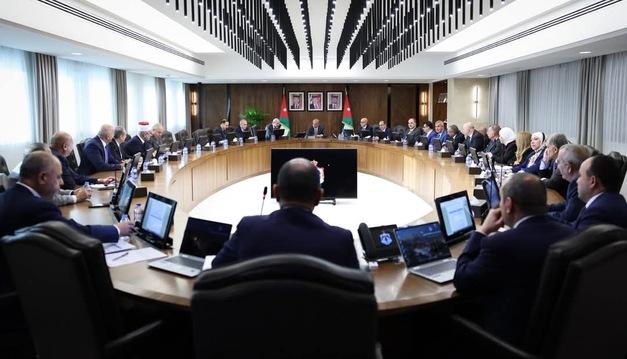You are here
Cabinet endorses 2025 amendments to Penal Code, says they enforce rule of law, enhance human rights
By JT - Apr 20,2025 - Last updated at Apr 20,2025

Prime Minister Jafar Hassan on Sunday chairs a Cabinet session, where amendments to Penal Code were approved (Photo courtesy of Prime Ministry)
AMMAN — The Cabinet on Sunday approved the 2025 amendment to the Penal Code, saying they are line with the government's policy statement committing to a wider use of alternative sentencing.
The proposed amendments will allow courts to replace prison sentences with community service and rehabilitation programmes both before and after court ruling, giving judges greater discretion and reducing prison overcrowding, according to a Prime Ministry’s statement.
Judges will also be empowered to collect fines under the Public Funds Collection Law and may allow payment in installments or deferral. The amendments support a shift towards restorative justice, which requires reconciliation between parties and financial compensation as a condition for sentence substitution, the statement said.
Other measures include the elimination of the 100-hour cap on community service, home confinement orders, geographic restrictions, electronic monitoring, and new safeguards such as travel bans and financial obligations by offenders to avoid contact with certain individuals or institutions.
The Cabinet also approved the validating reasons for amendments to the law on the Independent Election Commission in line with recent constitutional reforms, in particular Article 67, which expands the role of the commission to include the registration and supervision of political parties. The draft amendment is also in line with the Political Parties Law of 2022.
In a move that reaffirms the Kingdom's commitment to the rights of persons with disabilities, the Cabinet approved the bylaw of the National Academy for Inclusive Education for 2025. The move came following His Majesty King Abdullah's participation in the Third Global Disability Summit, according to the statement.
The Academy will develop institutional frameworks, implement quality standards and provide training for education professionals. It aims to institutionalise inclusive education, promote equal opportunities and support the integration of students with disabilities into mainstream education.
The Cabinet directed the Ministry of Water and Irrigation to proceed with the dissolution of the Wadi Araba Development Company and to transfer its functions and employees back to the Jordan Valley Authority. The move is part of a broader public sector modernization effort aimed at eliminating duplication of roles, improving operational efficiency, and consolidating administrative oversight.
The Cabinet also approved the 2025 Public Sector Organisational Structures Regulation, which redefines administrative levels and governance models in government ministries, mandates role reviews, and introduces strategic risk management plans.
In support of the Hashemite Custodianship over the Islamic holy sites in Jerusalem, the Cabinet approved amendments to ensure fair salary assessments for employees of the Jerusalem Awqaf Authority. These include Royal "steadfastness bonuses" and targeted salary increases for the Holy city's Sharia judiciary employees, with improved promotion conditions for qualified employees, the statement said.
The Cabinet ratified the final technical annexes for the Aqaba-Amman Water Desalination and Conveyance Project - known as the National Carrier. This massive infrastructure initiative, which will provide 300 million cubic meters of desalinated water annually, is the third largest water project in the region and a linchpin in Jordan's long-term water security strategy.
To support the integration of renewable energy, the Cabinet approved a new tender process to establish battery-based electricity storage systems for the national grid managed by the National Electric Power Company. The initiative is part of Jordan's energy diversification and sustainability agenda.
To stimulate the tourism sector, the Cabinet approved subsidies for participants in the "Urdunah Jannah" program until December 13, 2025. Jordanian citizens will be exempt from entrance fees to archaeological sites, and persons with disabilities will have their travel expenses fully covered. The program, which attracted more than 311,000 participants in 2024, provides guided, affordable travel experiences throughout Jordan.
Finally, the Cabinet approved a cooperation agreement between the Public Security Directorate and the United Nations to improve facilities and services at the King Hussein Bridge. The plan includes maintenance work, infrastructure upgrades, modern surveillance equipment, and staff training, supporting broader efforts to modernize cross-border logistics and passenger services.














